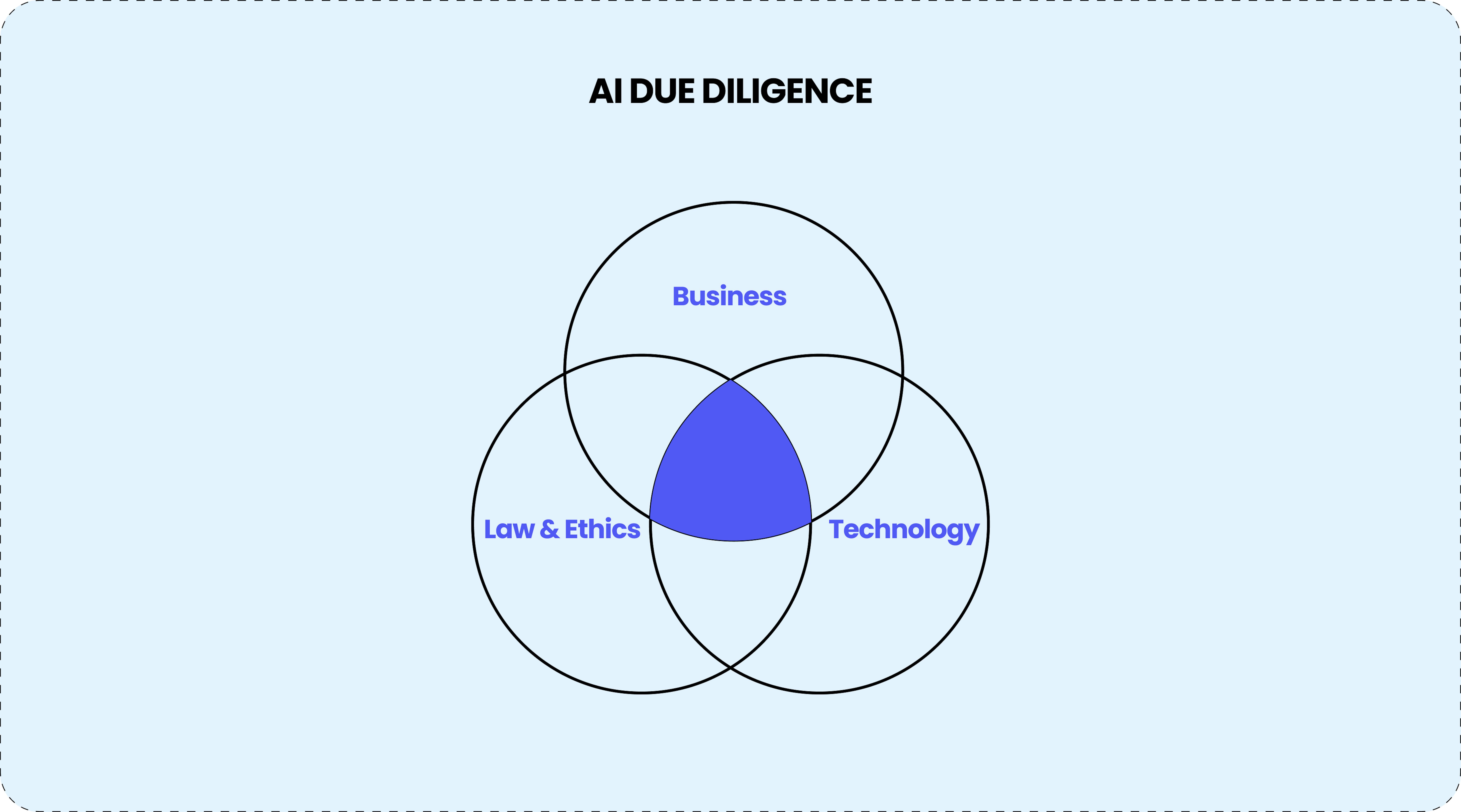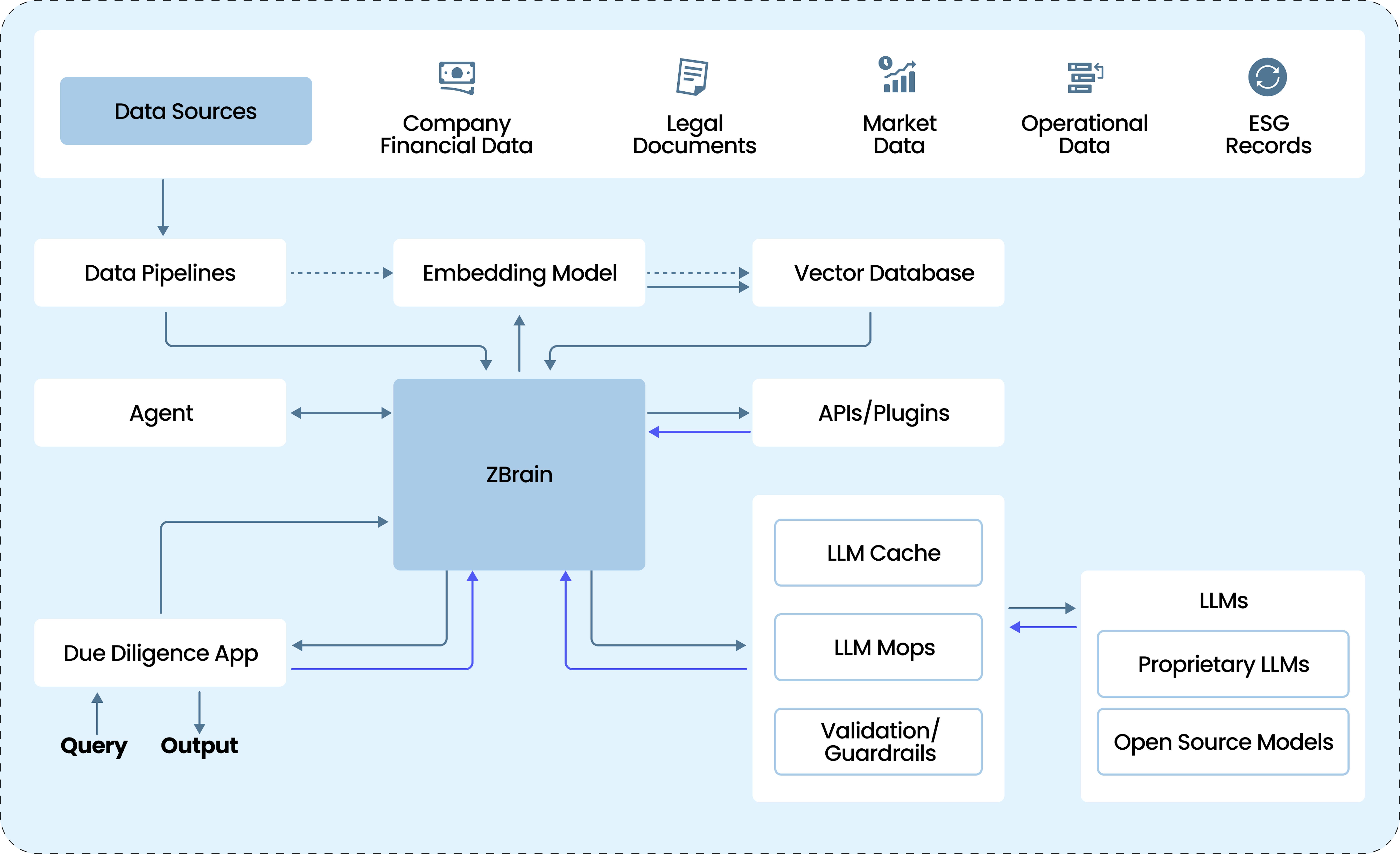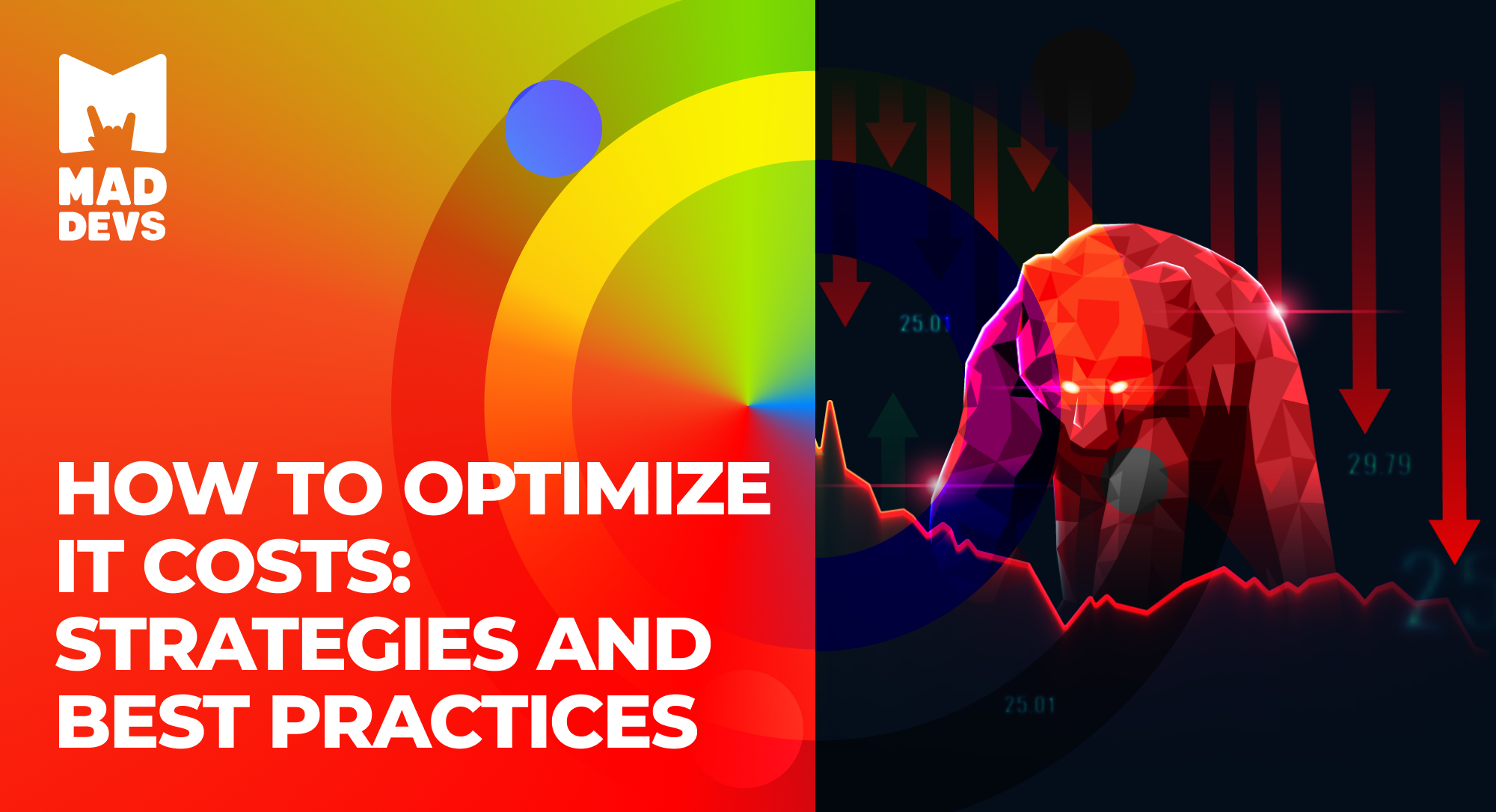Analyze with AI
Get AI-powered insights from this Mad Devs article:
Lately, assessing a company’s health has involved a time-consuming manual review. But with AI integration, due diligence has opened new opportunities to streamline processes and enhance decision-making. However, it also introduces unique challenges that need careful management.
This article delves into how AI-powered enhanced due diligence is transforming the field, exploring its benefits, current applications, and future possibilities.
Understanding AI's role in due diligence
First, due diligence is a thorough investigation to assess the risks and opportunities of a specific venture, transaction, or decision. It involves gathering information, analyzing data, and verifying facts to make informed choices. Key stakeholders who conduct due diligence include investors, companies, legal professionals, financial institutions, and government agencies.
The scope of due diligence varies depending on the context. For example, investors may focus on financial risks, while legal professionals may prioritize contractual terms.

AI is revolutionizing due diligence by automating tasks, analyzing data more efficiently, and providing deeper insights.
AI techniques used in due diligence include:
- Machine learning — Analyzes large datasets to identify patterns and trends.
- Natural language processing (NLP) — Extracts information from text documents and understands their meaning.
- Data analytics — Combines data from various sources to provide comprehensive insights.
🔍 Explore our comprehensive checklist for technical due diligence and gain insights that can significantly impact your project's success.
Opportunities of AI in due diligence
AI enhances AI-powered customer due diligence and AI and vendor due diligence by automating tasks like document review and risk assessment, improving efficiency, accuracy, and decision-making.
Here are some key benefits that AI can offer:
Enhanced efficiency and accuracy
- AI can automate tasks like document review, data extraction, and risk assessment, saving time and resources.
- These specific algorithms can analyze data more accurately and identify potential risks that human analysts might overlook.
Deeper insights and risk assessment
- AI can uncover hidden patterns and correlations in large datasets, providing deeper insights into potential risks and opportunities.
- It can forecast future trends and predict potential risks based on historical data.
Enhanced decision-making
- It can give businesses the data and insights needed to make informed decisions.
- Help identify and mitigate potential risks before they become significant problems.
Competitive advantage
- Accelerate the due diligence process, allowing businesses to close deals more quickly.
- By identifying and mitigating risks early on, businesses can gain a competitive advantage.
Cost reduction
- By automating tasks, AI can reduce the need for manual labor, resulting in significant cost savings.
- AI-powered due diligence can help businesses avoid costly mistakes by identifying potential risks early on, reducing costs, and improving ROI.
Challenges and risks of AI in due diligence
While AI offers significant opportunities, it also presents several challenges that must be addressed for practical implementation in due diligence.
Lack of stable testing environment
One of the key challenges is the lack of a stable and mature testing environment for AI technologies. This makes AI systems sometimes unreliable and not fully explainable, posing risks when applied to critical M&A processes.Legal and regulatory risks
The application of AI faces legal challenges due to insufficient global legislation. This can lead to potential security concerns and unpredictable outcomes, especially given AI's low error tolerance.Data security and privacy
AI's data collection methods may involve risks related to data security and privacy, particularly when acquiring sensitive information through non-compliant means. Ensuring that AI systems comply with data protection regulations is crucial to avoid infringements on rights and maintain trust.
How AI works in due diligence

Let's break down how AI architecture enhances the due diligence process with example tools and techniques provided:
Data sources
The AI-driven due diligence process starts by gathering data from various sources:
- Company financial data
- Legal documents
- Operational data
- ESG (Environmental, social, governance) records
Data pipelines
Data from these sources is funneled through data pipelines responsible for data ingestion, cleaning, and structuring. This ensures data is in a standardized, analyzable format. Tools like Apache Kafka and Airflow are often employed to manage data flow and preprocessing.
Embedding model
Structured data is then processed by an embedding model, transforming textual data into numerical vectors. These vectors allow AI models to understand the data. OpenAI, Google, and Cohere provide leading embedding models.
Vector database
Generated vectors are stored in a vector database, which allows for efficient querying and retrieval. Pinecone, Weaviate, and FAISS are commonly used vector databases that enable high-speed, semantic search capabilities.
APIs and plugins
APIs and plugins such as SerpAPI, Zapier, and Wolfram Alpha enhance system functionality by providing access to external data and tools. For instance, SerpAPI retrieves real-time web data, while Zapier automates workflows between multiple apps.
Orchestration layer
The orchestration layer manages the entire workflow, including prompt chaining, external API interactions, and memory retrieval across multiple LLM calls. Tools like LangChain, Chroma, or LlamaIndex manage these workflows and enable context continuity.
Query execution
Users submit queries related to various aspects of the target company, such as financial stability, legal risks, or operational challenges. The orchestration layer triggers the retrieval of relevant data and manages the entire analysis process.
LLM processing
The orchestration layer routes the query to the appropriate LLM for processing. The choice of LLM depends on the query, ensuring optimal responses. GPT-4, Claude, or Mistral are examples of models that may be used, depending on the requirements.
Output
Once processed, the LLM generates outputs such as:
- Factual summaries
- Risk assessments
- Draft reports
These outputs are presented to users through the application interface in an easy-to-interpret format.
Feedback loop
User feedback is vital for improving the AI's accuracy and relevance. This feedback is integrated into a continuous learning loop to fine-tune the model over time.
AI agents handle more complex problems, using advanced reasoning and tools to tackle challenging issues. These agents can execute tasks such as strategic planning or memory-based problem-solving, with the help of tools like Auto-GPT or BabyAGI for goal-oriented behavior and task automation.
LLM cache
Caching tools such as Redis, SQLite, or GPTCache store frequently accessed information, improving response time and efficiency by reducing the need for repetitive data processing.
Logging/LLMOps
Tools like Weights & Biases, MLflow, Helicone, and PromptLayer are used to log actions, monitor performance, and manage LLM operations (LLMOps). These tools track the model's actions, performance, and user interactions to ensure continuous improvement and efficiency.
Validation
A validation layer ensures the accuracy and reliability of the AI output. Tools such as Guardrails AI, Rebuff, and LMQL validate and cross-check information to maintain high accuracy standards throughout the process.
LLM APIs and hosting
For hosting and executing due diligence tasks, developers can use LLM APIs and hosting platforms. Providers like OpenAI, Anthropic, or Cohere offer robust APIs, while self-hosted solutions using Hugging Face Transformers or open-source models provide additional flexibility.
Remember that for AI due diligence in M&A and using AI for service provider due diligence, companies must prioritize continuous improvement and strict adherence to regulatory standards. As AI technology comes under heightened scrutiny from governments and regulators, maintaining compliance and staying updated with evolving regulations is essential for mitigating risks and ensuring ethical practices.
Regulatory compliance in AI
Regulatory compliance is critical to AI development and deployment, ensuring that AI systems are used ethically, responsibly, and in compliance with applicable laws. Investors and their legal counsel must carefully evaluate a company's compliance with:
Data privacy and protection
One of the most significant areas of AI regulation is data privacy, as AI systems often process vast amounts of sensitive personal information. The regulatory frameworks for data privacy vary by region, and compliance is crucial for companies deploying AI technologies globally. For example:
- GDPR (General Data Protection Regulation): Applicable to EU residents, the GDPR sets a high standard for data protection. AI companies must obtain explicit consent from individuals before processing their data, ensure robust data security, and provide rights to data access and deletion. Non-compliance can result in severe penalties.
- CCPA (California Consumer Privacy Act): Similar to GDPR but specific to California, CCPA grants residents the right to know what personal data is collected, request deletion of their data, and opt out of data sales. AI companies must be vigilant about data usage, transparency, and consumer rights in California.
- Other regional regulations: Beyond the EU and California, countries like Brazil (LGPD), India (DPDPB), and Canada (PIPEDA) have their own data privacy laws. These regulations demand that AI companies operating globally maintain compliance across multiple jurisdictions, adding layers of complexity.
Cybersecurity
AI systems are often deeply embedded in critical infrastructure and services, making them potential cyberattack targets. As a result, stringent cybersecurity protocols are necessary to protect both AI systems and the data they handle.
- Data breach notification laws — In many regions, AI companies are required to notify individuals and relevant authorities in the event of a data breach. These laws ensure transparency and accountability in how AI systems handle security risks.
- Critical infrastructure protection — AI technologies in sectors such as power grids, healthcare, and transportation must adhere to specialized cybersecurity standards. Governments often impose additional regulations to ensure that these AI systems are resilient against cyber threats.
- NIST Cybersecurity Framework — Although voluntary, the NIST (National Institute of Standards and Technology) framework provides a robust guideline for managing cybersecurity risks. AI companies, especially those involved in critical sectors, often adopt this framework to strengthen their security postures.
Industry-specific guidelines
The regulatory requirements for AI differ across industries, with each sector imposing its own rules and guidelines to ensure ethical, safe, and compliant use of the technology. For example:
- FinTech — AI in financial services must adhere to regulations like Basel III and the Dodd-Frank Act, ensuring that AI-driven decisions in lending, trading, and risk management align with regulatory requirements. Anti-money laundering (AML) laws also apply, requiring AI systems to detect and report suspicious financial activities.
- Biomedical — In healthcare, AI must comply with HIPAA (Health Insurance Portability and Accountability Act), ensuring patient data is protected. Additionally, medical AI devices often require FDA approval, and the use of AI in medical decision-making must follow ethical guidelines to ensure patient safety.
- Autonomous vehicles — AI systems in self-driving cars face varying regulations depending on the jurisdiction. These typically address safety, liability, and data privacy issues. Companies must stay updated on local laws to ensure compliance during development and deployment.
Potential liability
AI companies face significant legal exposure related to product liability, negligence, and algorithmic bias. As AI technologies continue to evolve, so do the risks of legal consequences for failing to meet certain standards of care and fairness.
- Product liability — AI developers can be held accountable if their products are defective and cause harm. This could include autonomous vehicles causing accidents or faulty medical devices leading to incorrect diagnoses.
- Negligence — Failing to exercise reasonable care during the development or deployment of AI systems can lead to liability claims. AI companies must ensure their technologies are tested, validated, and responsibly implemented to avoid legal pitfalls.
- Algorithmic bias — One of the most contentious issues in AI today is bias. If AI systems reinforce discrimination or unfair treatment—whether based on race, gender, or other protected attributes—companies face legal risks and reputational damage.
Required regulatory approvals
Before deploying specific AI applications, companies may need to obtain government licenses or pass ethical reviews, especially in sensitive fields like healthcare or autonomous systems.
- Government licenses — Certain high-risk AI applications, such as those in financial services or autonomous weapons, require special government approvals to ensure public safety and compliance with national security laws.
- Ethical review board — For AI applications in sectors like healthcare or social science research, ethical review boards often assess the potential societal impacts, ensuring that the technology is used responsibly and does not harm vulnerable populations.
Key regulatory frameworks to keep an eye on include:
Closely review and monitor these regulatory frameworks and others, conducting long-term risk assessments to evaluate how AI companies are aligning with both current and future regulatory requirements.
Approved in May 2024, the EU AI Act represents one of the most comprehensive regulatory efforts in the world, aimed at ensuring safe and ethical AI use. The act categorizes AI systems based on their risk levels, such as "limited risk," "high risk," or "unacceptable risk".
The EU AI Act's extraterritorial reach means that any company operating AI systems that affect EU residents, even if based outside the EU, must comply. This far-reaching impact makes it essential for global AI companies to monitor compliance closely, especially as the regulatory environment in the EU continues to evolve.
In November 2023, 28 nations, including the US, UK, EU, and Canada, signed the Bletchley Declaration, a major milestone in global AI regulation cooperation. This declaration focuses on:
- Harmonizing AI regulations across borders ensures a unified safety and governance approach.
- Identifying and mitigating AI safety risks, particularly emphasizing the potential dangers of advanced AI systems.
The Bletchley Declaration lays the groundwork for future international agreements on AI safety, making it an important regulatory initiative to monitor as cross-border collaboration on AI governance continues to evolve.
In October 2023, the US Executive Order on the Safe, Secure, and Trustworthy Development and Use of Artificial Intelligence was issued, marking a significant step in regulating AI development in the US. Key provisions of the order include:
- Mandating government bodies to develop AI standards that address safety, security, and ethical concerns.
- Encouraging AI developers to share safety test results with regulatory bodies to ensure transparency and accountability throughout the AI lifecycle.
- Promoting responsible AI use by balancing innovation with societal risk mitigation.
This executive order highlights the US government's growing focus on AI safety and the potential for future legislation that may further regulate AI across industries.
Introduced in 2022 as part of Bill C-27, the Artificial Intelligence and Data Act (AIDA) targets high-impact AI systems, particularly those that pose significant risks to privacy, security, and human rights. Although still moving through the legislative process, AIDA imposes strict obligations on AI developers throughout the system's lifecycle.
From September 27, 2023, Canada's Voluntary Code of Conduct on the Responsible Development and Management of Advanced Generative AI Systems encourages organizations to adopt best practices for AI development. While not legally binding, the code offers guidelines on:
- Ensuring transparency in the development and use of generative AI systems.
- Implementing safety measures to minimize the risks of misuse or unintended consequences.
- Promoting accountability and ethical responsibility for organizations deploying these AI systems.
Though voluntary, this code signals a move toward more formal regulation in Canada, especially as generative AI continues to influence various sectors.
By closely monitoring and adapting to these key regulatory frameworks, AI companies can mitigate risks, ensure ethical practices, and stay competitive in an increasingly regulated environment.
Future trends for AI in due diligence
The use of AI in due diligence is rapidly evolving, with several key trends shaping its future. These advancements will enhance the accuracy, speed, and reliability of due diligence processes, allowing companies to make better-informed decisions. Below are some critical trends to watch:
Advanced NLP
One of the most significant future trends in AI for due diligence is the improvement of Natural Language Processing (NLP) capabilities. Due diligence often requires the analysis of vast amounts of unstructured data, such as contracts, emails, reports, and legal documents. Advanced NLP algorithms will:
- Better understand context and nuance in legal and financial texts, enabling AI to extract relevant information with greater accuracy.
- Summarize complex documents, making it easier for stakeholders to focus on key details without manually sifting through extensive information.
- Identify hidden risks in unstructured data that could be missed during manual reviews, such as subtle changes in legal language or inconsistent financial statements.
As NLP technologies advance, AI-driven due diligence will become increasingly effective at analyzing and interpreting vast amounts of complex data, streamlining decision-making processes.
Explainable AI
As AI systems become more sophisticated, Explainable AI (XAI) will play a crucial role in due diligence. XAI enables users to understand the reasoning behind AI-generated decisions or recommendations, which is essential for building trust and ensuring regulatory compliance. In the context of due diligence, XAI will:
- Provide transparent insights into how AI arrives at specific conclusions, such as risk assessments or financial forecasts.
- Help meet regulatory requirements, as explainability is becoming a key factor in AI governance frameworks, ensuring that AI systems are accountable and auditable.
- Improve stakeholder confidence, as investors, regulators, and legal teams will better understand the logic behind AI-driven analyses, leading to more informed decisions.
With XAI, companies will be able to trust AI-driven due diligence processes and defend the integrity of AI-based decisions when questioned by regulators or investors.
Predictive analytics
The integration of Predictive Analytics in due diligence processes will allow companies to assess current risks and anticipate future market trends and potential issues. Leveraging large datasets, AI can:
- Predict market shifts by analyzing historical data and identifying patterns that suggest future trends, giving companies a competitive edge in strategic planning.
- Forecast risks, such as potential economic downturns or regulatory changes, that could impact an investment or acquisition. AI can simulate different scenarios to evaluate potential outcomes.
- Monitor competitor behavior, detecting trends in their financial or operational data to gauge potential risks or opportunities in the market.
By using AI for predictive analytics, businesses can conduct more forward-looking due diligence, allowing them to act proactively rather than reactively in rapidly changing markets.
AI for real-time due diligence
The rise of real-time data processing will make it possible for AI systems to conduct continuous due diligence, providing up-to-the-minute insights into a target company's financial health, legal standing, and market position. Key benefits include:
- Ongoing risk monitoring allows businesses to keep tabs on the target even after the initial due diligence phase.
- Real-time alerts about significant changes, such as regulatory violations or sudden shifts in stock price, enable immediate action.
As AI systems become more capable of handling real-time data, due diligence processes will shift from static, one-time assessments to dynamic, ongoing evaluations.
Automated regulatory compliance checks
With AI's increasing ability to understand and interpret legal texts, automated regulatory compliance checks will become more prevalent in due diligence. AI can scan various jurisdictions' regulatory frameworks, ensuring that a company or deal complies with relevant laws. This trend will:
- Reduce human error in compliance checks by automating the detection of regulatory violations.
- Speed up cross-border deals, where multiple regulatory environments need to be considered.
- Keep up with changing regulations, ensuring that due diligence processes remain aligned with the latest legal requirements in different markets.
By automating compliance, AI will streamline the regulatory aspect of due diligence, making it more efficient and reliable.
To wrap up
AI holds immense potential to revolutionize due diligence, offering faster, more accurate, and comprehensive analyses. By automating data analysis, improving predictive capabilities, and enhancing transparency, AI can streamline complex processes, saving time and reducing risks. However, to fully harness these benefits, companies must address key challenges such as ensuring data quality, maintaining transparency in AI decision-making, and navigating ethical concerns around privacy and fairness.
If you're ready to explore how AI can transform your due diligence process, schedule a free consultation with Mad Devs. Our experts will guide you through the best AI tools and strategies tailored to your business needs.










